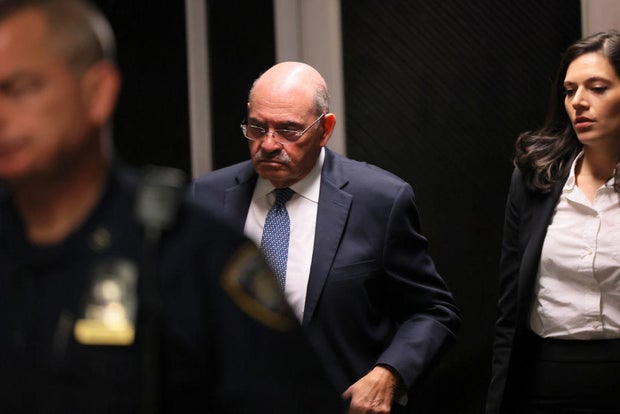The judge in former President Donald Trump’s New York civil fraud trial indicated Tuesday he’s weighing how a potential perjury charge against Alan Weisselberg, the former chief financial officer of the Trump Organization, might factor into his final ruling.
Judge Arthur Engoron wrote to lawyers for Trump and the New York Attorney General’s Office asking for guidance on how to handle a report in the New York Times last week that said Weisselberg is in talks to plead guilty to lying on the stand.
Weisselberg’s October testimony in the civil case, in which he is also a defendant, was unexpectedly cut short after Forbes published an article claiming he lied under oath.
In 2017, the magazine reported that financial statements had described Trump’s penthouse apartment in Trump Tower as much larger and worth hundreds of millions of dollars more than its true size and value.
Weisselberg testified that he “never focused” on the valuation of the triplex apartment, but the Forbes article in October said Weisselberg’s emails to reporters from years earlier showed he “played a key role” in supporting the apartment’s false valuation.
Weisselberg has been in negotiations with the Manhattan district attorney to plead guilty to perjury for the testimony, which was under oath, the New York Times reported on Feb. 1. A source with knowledge of the matter confirmed the negotiations to CBS News.
A spokesperson for Manhattan District Attorney Alvin Bragg declined to comment. Bragg’s office secured a previous guilty plea from Weisselberg in connection with its 2022 criminal tax fraud case against the company, in which the Trump Organization was found guilty of 17 felony counts.
James’ office declined to comment. Attorneys for the defendants did not reply to requests for comment.
While the Forbes story focused on Weisselberg’s testimony about the Trump Tower apartment, Engoron said in his letter to lawyers that “other topics could also be called into question” if Weisselberg admits to perjury. The judge indicated he might conclude that the entirety of Weisselberg’s hourslong testimony was not credible.
He gave attorneys until Wednesday at 5 p.m. to submit a letter to him “detailing anything you know about this that would not violate any of your professional ethics or obligations.”
“I would also appreciate knowing how you think I should address this matter, if at all, including the timing of the final decision,” Engoron wrote.
The judge’s ruling in the case was initially expected by Jan. 31. He has already found Trump and the other defendants liable for fraud, but has yet to rule on other related allegations that were the subject of the trial. Trump and his co-defendants have all denied wrongdoing.
Engoron’s ruling was delayed after a Jan. 26 letter from a special monitor overseeing the Trump Organization’s finances detailed shortcomings and discrepancies in the company’s recent financial disclosures.

